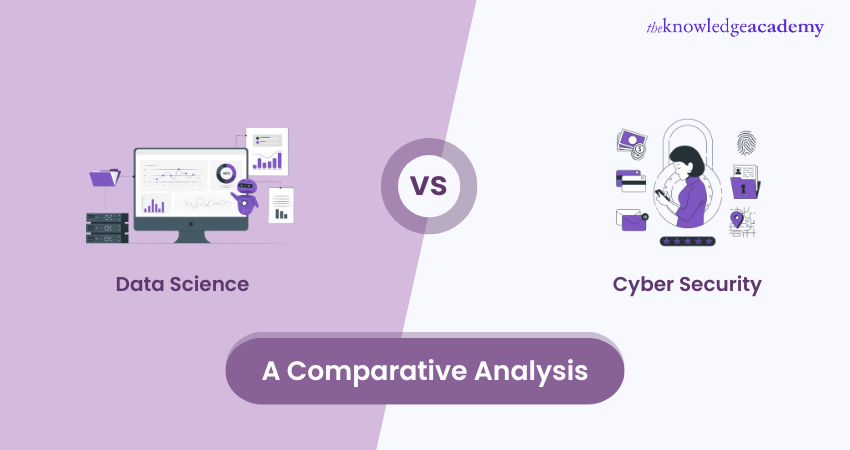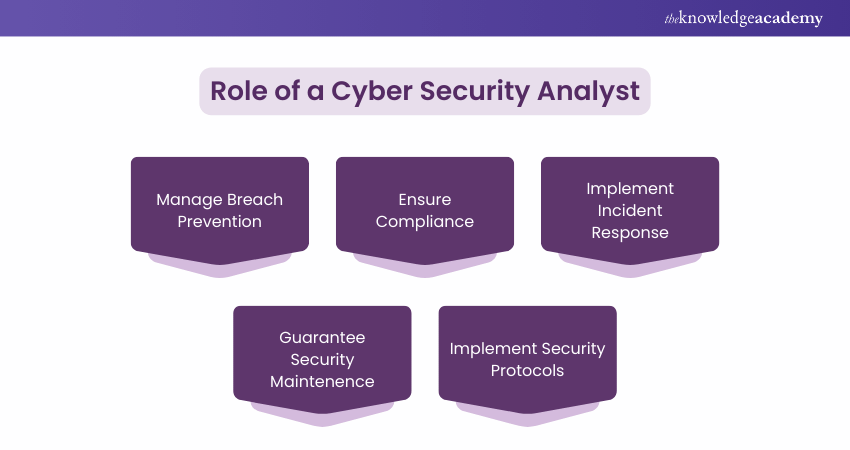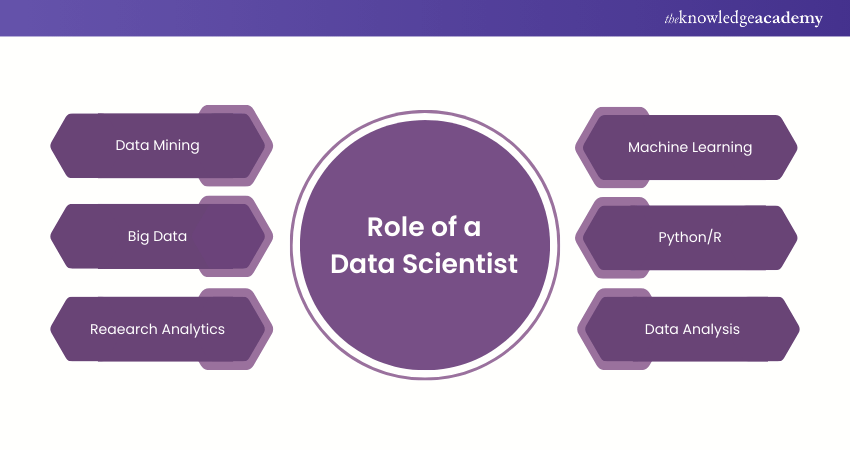We may not have the course you’re looking for. If you enquire or give us a call on 800600725 and speak to our training experts, we may still be able to help with your training requirements.
Training Outcomes Within Your Budget!
We ensure quality, budget-alignment, and timely delivery by our expert instructors.

Think of Data Science and Cyber Security as two pillars holding up the digital world. Both fields have emerged as key players in shaping industries, but each tackles very different challenges. Understanding the differences between Data Science vs Cyber Security can help you navigate these fields more effectively.
When deciding between a career in Data Science vs Cyber Security, it's essential to consider your interests and strengths. Do you enjoy exploring data to uncover hidden patterns, or are you more drawn to the idea of protecting networks from cyber threats? In this blog, we’ll break down the key differences between these two dynamic fields to help you make an informed choice.
Table of Contents
1) Introduction to Cyber Security
2) Role of a Cyber Security Analyst - Explained
3) Understanding Data Science
4) What is the Role of a Data Scientist?
5) How are Cyber Security and Data Science Interrelated?
6) Difference Between Data Science and Cyber Security
7) Tips for Choosing Between Cyber Security and Data Science
8) Cyber Security vs. Data Science Career Paths and Growth
9) Conclusion
Introduction to Cyber Security
Cyber Security includes practices and technologies that safeguard networks and systems against cyberattacks, unauthorised access, and cyber threats. The objective is to prevent third parties from misusing the organisation’s sensitive data.
Cyber Security is divided into five different fields:
a) Cloud Security
b) Critical Infrastructure Security
c) Application Security
d) Internet of Things (IoT) security
e) Network Security
Role of a Cyber Security Analyst - Explained

A Cyber Security Analyst ensures that an organisation’s networking and computer systems are secured. Cyber Security Analysts carry out this task by identifying any underlying issue in the organisation's software and technology, focusing on Cyber Security Essentials.
These Analysts also carry out the following responsibilities:
a) Adding firewalls to existing networking systems
b) Assessing the access permissions
c) Improving the security of Information Technology infrastructure
d) Monitoring cyber-attacks on the organisation’s networking systems
e) Detection and removal of risks related to potential data breaches
f) Finding out the source of cyber attacks
g) Ensuring employees of the organisation are familiar with the security policies
Understanding Data Science
Data Science simplifies the task of studying complex and large data sets. Consequently, it helps to extract and analyse meaningful data to make informed decisions in real-time. Data Science includes tools, Machine Learning methods, and instructions. These resources are used together to identify new raw data trends.
Data Science includes five phases: planning, deploying, explaining, evaluating, and monitoring a data-driven model. Professionals who work in the domain of Data Science are known as Data Scientists.
Data Scientists have the knowledge required to obtain raw data and convert it into an easy-to-analyse format. Next, this data is entered into models and algorithms to gain actionable insights.
What is the Role of a Data Scientist?

Data Scientists can collect vast volumes of data, process it, and interpret it for further business use. Next, the data scientist will analyse the information derived to solve the organisation's issues. Most importantly, this data helps in making informed and real-time decisions. Additionally, a Data Scientist must fulfil the following duties:
1) Carrying out steps involved in data modelling and designing
2) Creation of algorithms that are used in Machine Learning
3) Creation and complete maintenance of the database
4) Evaluating the quality of data
5) Cleaning unstructured data
6) Preparation of reports for the project and executive teams
7) Offering necessary suggestions to the IT management and executive team
Master Data Science skills and elevate your career with our Data Science Courses today!
How are Cyber Security and Data Science Interrelated?
Cyber Security and Data Science are becoming more interrelated areas that collaborate to improve the security and effectiveness of digital systems. Both fields fundamentally depend on analysing data to guide their methods. Data Science uses statistical techniques, Machine Learning, and predictive analytics to analyse extensive datasets, revealing patterns that are extremely useful for Cyber Security experts.
In the field of Cyber Security, data plays a critical role in detecting potential risks and weaknesses. Data Science techniques assist security teams in identifying potential attacks by examining network traffic and user behaviour for anomalies. For example, Machine Learning Algorithms can be trained on past attack data, enabling systems to more rapidly and precisely identify emerging threats.
On the other hand, Data Science relies on Cyber Security to safeguard the integrity of its data. Ensuring the security of sensitive information is crucial due to increasing worries about data breaches and privacy violations. Strong security measures for cyber Security protect the data analysed by Data Scientists, building confidence in the insights obtained from it.
In short, the interrelation between Cyber Security and Data Science improves an organisation's ability to withstand Cyber threats by allowing for proactive management of risks and using trustworthy data for decision-making.
Learn how to prevent cyber threats. Check out our Cyber Security Awareness Course today!
Difference Between Data Science and Cyber Security
The difference between Data Science vs Cyber Security is explained in the table below:
|
Basis |
Cyber Security |
Data Science |
|
Role |
Cyber Security experts develop security systems to protect an organisation's networks, data, and systems. |
Data Science experts analyse raw data to develop models and derive actionable insights. |
|
Expertise |
Cyber Security professionals monitor and secure data and networks. |
Data Science experts analyse data, build models, and use Machine Learning and Prescriptive Analytics to extract insights from raw data. |
|
Education level |
A degree in information security, computer engineering, or computer science is essential for Cyber Security professionals. |
To become a Data Scientist, it’s important to possess a bachelor’s and master's degree in Data Science. |
|
Skills |
Cyber Security experts should have an incident response, problem-solving, and intrusion detection skills. |
Data Science experts should be skilled in SQL, Python, ML, AI techniques, and basic statistics. |
|
Designation |
Cyber Security experts can work as Analysts, Cryptographers, Systems Engineers, and Network Engineers. |
Data Science experts can work as Data Analysts, Data Scientists, Data Engineers, Data Architects, or Machine Learning Engineers. |
Explore the career opportunities in Data Science. Register for our Probability And Statistics For Data Science Training!
Tips for Choosing Between Cyber Security and Data Science
If you're thinking about pursuing a profession in either Cyber Security or Data Science, here are some suggestions to assist you in deciding:
1) Evaluate Your Timeline
If you're anxious to start working soon, getting a degree in Cyber Security usually takes less time. After finishing a four-year bachelor's degree, it is common to begin in an entry-level role. Although some positions in Data Science allow applicants with just a bachelor's degree, a majority prefer candidates with higher-level qualifications.
2) Assess Your Interest in Business
Both areas require technical skills, however Data Scientists implement their discoveries in real-life business situations. They assess data to assess business situations, anticipate results, and inform decision-making. If you find satisfaction in studying Business Intelligence, a profession in Data Science could be a perfect match.
In contrast, Cyber Security experts prioritise protecting infrastructures according to business requirements and commonly perform separate technical duties. They commonly collaborate with business specialists to establish requirements and create suitable security solutions.
3) Reflect on Your Skills
Both disciplines necessitate programming, critical thinking, and problem-solving skills, but they each call for distinct areas of expertise. If you are skilled in Mathematics and Statistics and like working with different programming languages, Data Science might be a better fit for you. Data Scientists frequently possess a solid background in Machine Learning and Data Visualisation methods.
Gain skills in the detection and investigation of cybercrime. Sign up for our Cyber Security Risk Management Course to learn more!
Cyber Security vs. Data Science Career Paths and Growth
Typically, individuals in the field of Cyber Security begin their career journey by obtaining a Bachelor’s degree in Cyber Security, Computer Science, or a related field, acquiring expertise in Programming, Cloud Computing, and Network Administration. Once they have gained beginner-level experience, they have the opportunity to pursue higher positions that typically demand a Master's degree and suitable certifications. Common career options include:
a) Chief Information Security Officer
b) IT Security Consultant
c) Security Analyst
d) Security Architect
e) Penetration Tester
f) Ethical Hacker
Data Science roles typically demand higher levels of formal education. Having a Bachelor's degree in Data Science, Computer Science, or a related field is crucial, along with experience in a beginner position. Ambitious Data Scientists should seek a Master's degree and appropriate certifications to progress in their careers. Some common career options are:
a) Data Engineer
b) Machine Learning Engineer
c) Marketing Manager
d) Product Manager
e) Data Leader
Conclusion
In conclusion, as you weigh the decision between Data Science vs Cyber Security, this blog has equipped you with a clear understanding of both fields—highlighting their unique challenges, skills, and career paths. Whether you are drawn to uncovering insights from vast data sets or protecting critical digital assets from cyber threats, you now have the knowledge to pursue your passion. The choice is yours—embrace it, and start building your future today!
Unlock Python's potential for Data Science mastery with our Python Data Science Course – Sign up now!
Frequently Asked Questions

Yes, Data Science is widely applied in the field of Cyber Security. Assisting in analysing large quantities of security data aids in identifying patterns, detecting anomalies, and predicting threats. Through the utilisation of Machine Learning algorithms, Data Scientists can bolster threat detection and enhance security measures.

Overall, professionals in Data Science usually make more money than experts in Cyber Security. Industry reports indicate that Data Scientists typically earn higher salaries than Cyber Security professionals, particularly at more advanced career stages.

The Knowledge Academy takes global learning to new heights, offering over 30,000 online courses across 490+ locations in 220 countries. This expansive reach ensures accessibility and convenience for learners worldwide.
Alongside our diverse Online Course Catalogue, encompassing 19 major categories, we go the extra mile by providing a plethora of free educational Online Resources like News updates, Blogs, videos, webinars, and interview questions. Tailoring learning experiences further, professionals can maximise value with customisable Course Bundles of TKA.

The Knowledge Academy’s Knowledge Pass, a prepaid voucher, adds another layer of flexibility, allowing course bookings over a 12-month period. Join us on a journey where education knows no bounds.

The Knowledge Academy offers various Cyber Security Training, including the Cyber Security Awareness, Cyber Security Risk Management, and Certified Cyber Security Professional (CCS-PRO). These courses cater to different skill levels, providing comprehensive insights into Cyber Laws.
Our IT Security & Data Protection Blogs cover a range of topics related to Cyber Security, offering valuable resources, best practices, and industry insights. Whether you are a beginner or looking to advance your IT Security skills, The Knowledge Academy's diverse courses and informative blogs have got you covered.
Upcoming Data, Analytics & AI Resources Batches & Dates
Date
 Certified Cyber Security Professional (CCS-PRO)
Certified Cyber Security Professional (CCS-PRO)
Fri 21st Mar 2025
Fri 23rd May 2025
Fri 22nd Aug 2025
Fri 5th Dec 2025







 Top Rated Course
Top Rated Course



 If you wish to make any changes to your course, please
If you wish to make any changes to your course, please


